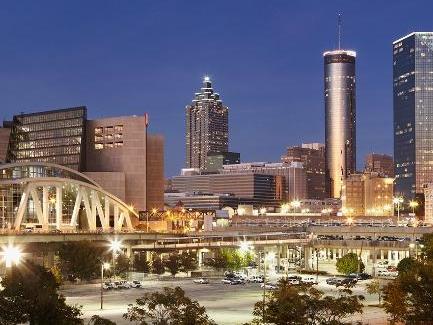
Section Branding
Header Content
Why 'Money' magazine named Atlanta the best city in U.S.
Primary Content
LISTEN: For the first time, Atlanta has been named the best city in the U.S. by "Money" magazine this year. GPB's Peter Biello discusses the list with "Money" writer and editor Kristen Bahler.

For the first time, Atlanta has been named the best city in the U.S. by Money magazine this year. The publication says it focused on the qualities of a city that help make everyone feel like they belong. GPB's Peter Biello discussed the list with Money magazine writer and editor Kristen Bahler.
Peter Biello: Money magazine has been doing this ranking for quite some time now, more than three decades. Why the change in focus to emphasize qualities that help people feel like they belong?
Kristen Bahler: Our world is changing. And while we have always looked at diversity, we decided to take a deeper dive this year. So we looked at not just racial diversity as the census defines it, but we also looked at religious diversity, age diversity, heritage and languages spoken at home.
Peter Biello: You write that lots of cities and towns across the United States have greenspace. They have trees. They have bike paths. But Atlanta's got a lot of those things. So what stood out to you about Atlanta's greenspace?
Kristen Bahler: This is a city that is working really hard to expand its bike paths. There are more trees in Atlanta per capita than any other city in the U.S.. There are parks. There are just so, so many ways that families can go enjoy themselves outdoors in Atlanta.
Peter Biello: The flipside of this is that there are laws passed statewide in Georgia that have not landed the state at the top of anyone's lists. For example, pregnant people have lost legal access to abortion after about six weeks. There are also laws that prevent people from giving water to people standing in long lines to vote on Election Day. To what extent did state laws have any bearing on whether or not a city was "best"?
Kristen Bahler: That definitely played into our decision making. I personally thought long and hard about whether or not it was right to name a No. 1 city in a state that has made it an inhospitable place (to put it kindly) for women. In the end, we found that the city and community groups have made it a priority to help women who are in the city get access to abortion. So there are abortion funds that are funded by the city that actually help women travel to abortion clinics outside of Georgia. It's not perfect by any means, but the city is doing what it can to help women.
Peter Biello: What about public transportation? It wasn't mentioned in your article, but seems to be one of those things that would matter a lot if we're talking about inclusivity.
Kristen Bahler: Yeah, there's really no getting around it. Traffic is a is a jumble. There are, on the other hand, a bunch of projects to finally make driving and commuting less of a nightmare in Atlanta. So the National Science Foundation recently gave a Georgia Tech research team a million-dollar grant for a project that specifically designed to make public transportation in Atlanta better and more accessible to underserved communities.
Peter Biello: So when you were writing this article, Kristen, did you come to Atlanta to check it out?
Kristen Bahler: Can I answer off the record? No, I'm just kidding. It wasn't in our budget this year, which I recognize is kind of a bizarre outlier when it comes to these sorts of reporting projects. But because I haven't visited Atlanta, I do think I was able to look at it purely from an outsider's perspective and just look at the data, look at the reporting, and talk to people that have been doing it. Kind of come up with this this group decision that we came up with.
Peter Biello: What did you learn about Atlanta that really made you say, "I want to go check that out"?
Kristen Bahler: So much. What really stood out to me about Atlanta was that there is this real buy-in on a government level when it comes to diversity. They didn't just create a diversity committee like many places do or claim to do. They created essentially a new branch of city government with objectives that they are required to hit as pertains to affordable housing, creating a diverse workforce and a diverse type of jobs, as well as providing money to grassroots, ground-level community groups that are in the most disenfranchised neighborhoods feeding people, housing people, and communicating with the city about what needs to be done. These are issues that officials are putting lots of resources into, and they are really trying to preserve the communities and cultures that make Atlanta Atlanta.

